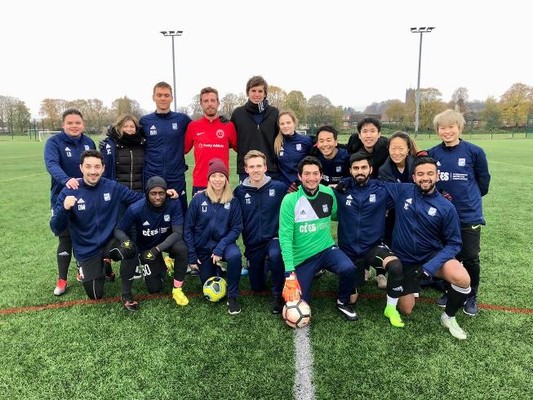
“Sport is a universal language, building more bridges between people than anything else I can think of”
- Sebastian Coe
For the FIFA Master 20th Edition, November was themed around the internationalisation of sport, with the words of double Olympic gold medalist and IAAF President Seb Coe suitably summarising our last month, both inside and outside of the classroom. Moving from the history books to the modern day, we worked through the core challenges affecting sport as it continues to globalise, exploring how it both unites and divides people around the world.
Expert lectures from academics and authors took us around the planet and brought these issues to life, with James Esson’s stories of aspiring Ghanaian footballers and Richard Mills’ historical tour of the former Yugoslavia both particular highlights. It was fascinating to review the huge importance that football plays in debates around wars, borders and human rights, making us all even more aware of how significant sport can be away from the field of play.
It wouldn’t be the FIFA Master without insight from world football’s governing body, and we have been lucky enough to host a range of visitors from their Zurich HQ, talking us through FIFA’s role in hosting tournaments, working to increase inclusion and continuing to develop the sport with a truly global footprint.
Guest speakers from the English FA were similarly insightful on topics of inclusion and the growth of the women’s game, and we were also privileged enough to hear directly from the Qatar 2022 Organising Committee, on their ambitious plans for the world’s first Middle Eastern (and winter) World Cup.
Away from football, we were taken on a full 120 year journey through the history of the Olympics by David Goldblatt and Pierre Lanfranchi, looking at how politics and international relations have shaped the evolution of the world’s longest standing sporting mega event. Cricket (a game not so familiar to the whole class…) took centre stage for our discussions of sporting diplomacy, looking at the ongoing battles both on and off the field between India and Pakistan.
As well as learning from the experts, we all took turns at sharing our sporting experiences and cultures with one another, in the form of the ‘National Presentations’. With our group comprising 32 individuals from 28 different nations, this made for an incredible week of self-teaching.
For example, did you know that Aussies call McDonalds “Maccas”? Or that Morocco has bid and failed for the World Cup five times? We also had a joint presentation between Belgium and the Netherlands, comparing their cross-border similarities and differences. We learned about the “Pura Vida” of the Costa Ricans, had a cultural tour through South American football life, and heard from all corners of the African continent. Our classmates from Israel and Palestine presented back to back in a fascinating review of the role that sport plays in their region, and by the end of the week we had covered the globe!
Outside the classroom, our schedule has been very hectic as well. A few of our classmates travelled to Dublin to experience the ‘luck of the Irish’, and others found themselves spontaneously sharing chips with Jeremy Corbyn on Whitby beach in the run up to the British election. There have been visits to a whole host of games from across the whole spectrum of English football (Newcastle United and Tranmere Rovers particular highlights), while others experienced the ATP tennis Finals in London, as well as Leicester Riders basketball.
As the festive season approaches, it has been mandatory to visit Birmingham's Christmas Market for some mulled wine and waffles. Continuing with our unconventional (and late night) football watching, we had the CONCACAF League final between FC Motagua and Deportivo Saprissa, creating an interesting rivalry between our Honduran and Costa Rican classmates, which ended with a free dinner for our Saprissista fan. Another highlight of this month was the football matches (home and away) that we played against another Sports Masters from Liverpool. The scores aren’t relevant since, quoting the founder of the Olympics Pierre de Coubertin, “the important thing in life is not to triumph but to compete...”
As we head into our final month in Leicester, we have been working more and more on our final project ideas, looking at solving exciting challenges in the world of sport. It has been a rollercoaster ride so far, with ideas evolving and changing all the time, but it is all part of our journey. So stay tuned for our final report from the UK as we present our ideas to the Scientific Committee in the next couple of weeks.
Erika Urbina Echeverría and James Cronin (Class Reps)
FIFA Master - International Master in Management, Law and Humanities of Sport, ranked No.1 Course in Europe 2012, 2013, 2014, 2015, 2017, 2018 and 2019 by the SportBusiness International global rankings.
Organised by CIES in partnership with De Montfort University (United Kingdom), SDA Bocconi School of Management (Italy) and the University of Neuchâtel (Switzerland).
This website uses cookies – limited to technical and analytical cookies – in order to allow your browsing and enhance your experience.
For more information, please see our cookie policy and our privacy notice.